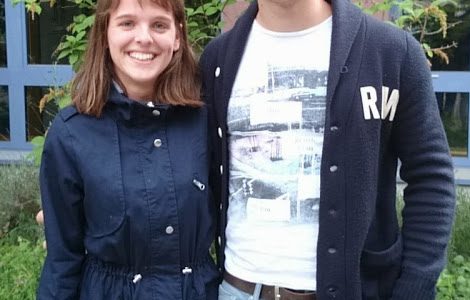Interview with Annabelle Wagner & Fabian Fries,Supervisors of EaT Homburg, Germany
Homburg, Saarland. Marlboro country? In any case, the proportion of parents who smoke is particularly high when compared to the national average. In many places education doesn’t seem to work. Homburg medical students and friends Annabelle Wagner (23) and Fabian Fries (23) didn’t want to tolerate this state of affairs any more and two years ago they founded the Education Against Tobacco project at the University of Homburg. To find out what motivates the young medics, I conducted an interview with them.
Anna and Fabian, why are you involved in this alongside your medical degree?
‘Smoking and passive smoking particularly are topics that are very close to our hearts. You just have to walk through Homburg town center on a five-minute trip to the shops and you will certainly see at least ten mothers or fathers holding their child in one hand and a cigarette in the other. The Saarland is a state with a high proportion of pregnant women who smoke and there are also a high proportion of premature births and babies with a small gestational age as a consequence. I don’t need to name the consequences of passive smoking on the health of these and older children. To reduce the number of people smoking, we have to continue with education. It’s not enough just to say that smoking harms your health. Young people more than anyone else hear again and again the words: ‘Don’t smoke, smoking is harmful.’ But they’re never told why smoking is harmful, what it does to the body and why it’s best to leave cigarettes well alone. After our presentations and classroom seminars, it’s always nice to see how the school children have understood why they’re advised against taking up smoking. You realize that the children are grateful for this education and we also receive that feedback from the schools.’
What is the status of the elective module in Homburg? Are you going to be able to keep it on the curriculum in Homburg in the long term?
‘We’re in the final planning stages for the elective course at the moment. Hopefully it will be offered in the winter semester 14/15.’
Do your medical studies suffer because of your involvement?
‘In our opinion, the social aspects of the profession – how to deal with patients as individuals – are as important as the theory that we learn as part of our degree. That means being able to put yourself in your patient’s shoes, to understand and recognize why a patient might reach for a cigarette, and why they can’t give up smoking. The work with EAT really helps us gain the necessary experience in dealing with patients. Through our volunteer work, we’re not just giving – we’re also getting a lot in return. Prevention is likewise a very important part of our work as doctors – it doesn’t matter what your specialty is. We don’t see it just as volunteer work, but as the responsibility of every medic.’
What have been the biggest challenges and best experiences so far as part of your work?
‘The school visits are the best bits. It’s always interesting to see how the children are a little disconnected at the beginning of our visit. Then they find out from us that, as a consequence of smoking, patients feel pain when they walk, find it hard to breath and die from tumors. They also find out that passive smoking can bring on exactly the same medical conditions, as well as risk factors for sudden infant death syndrome. During the classroom seminars you notice, increasingly clearly, how interested the children are, and they realize that smoking is a topic that affects us all, even non-smokers. You realize that the children are grateful for this information. They’re grateful that someone is finally telling them why smoking is harmful for their bodies, rather than just banning them from smoking.’
How was the topic of tobacco-related education received in the Saarland?
‘The tobacco education program was completely positively received by the schools we work with as well as by the professors at the university. Many schools in the Saarland already have their own addiction prevention programs. Over the coming months we want to convince these schools of the slightly alternative approach taken by EAT.’
Thank you for the interview and good luck for the future!
For more information: www.gegentabak.de/universitaet-homburg

